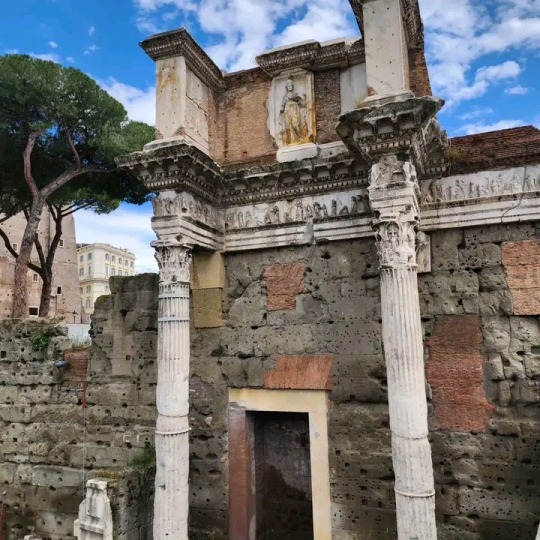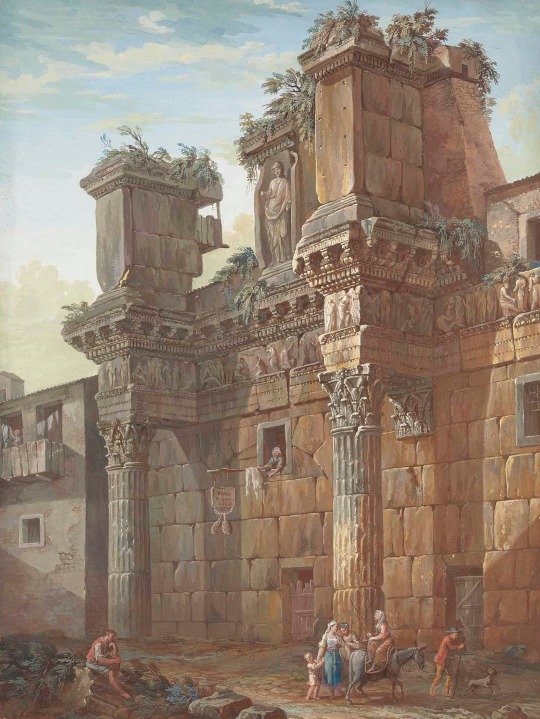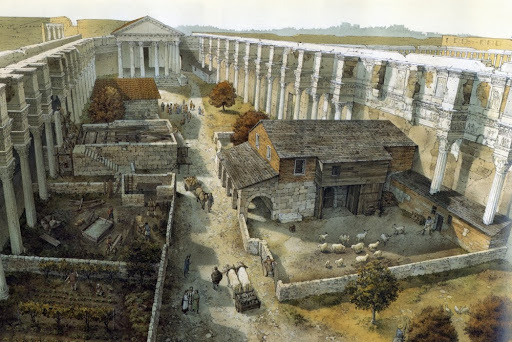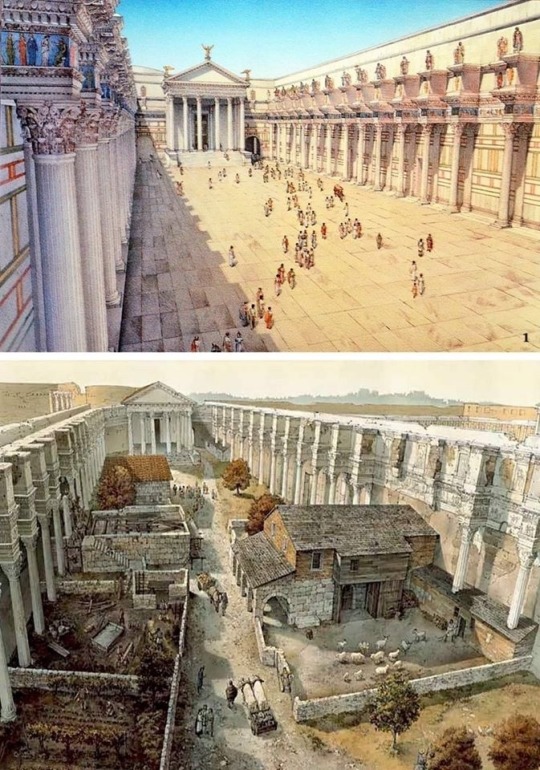#forum nervae
Explore tagged Tumblr posts
Text
Optimus princeps

Marcus Ulpius Trajan was born on 18 September 53 in Hispania Baetica ( Andalusia, Spain) in the ancient city Italica. He stood out for his military and political brilliance, his uprightness and fight against corruption, his austere character, and his philanthropy.
He was the only Roman emperor to whom he granted the title Optimus (The Best). With him the so-called Golden Age of the Roman Empire began. With him also began the so-called era of provincial emperors. Roman authors note his "charming provincial accent." The historian Dio Cassius claims that Trajan was of Hispanic origin.
Trajan created Institutio Alimentaria, a program that helped orphaned and poor children throughout the Roman Empire. It provided food and subsidized education.
He conquered Dacia (Roman Dacia would evolve over time to give rise to present-day Romania) and defeated the Parthian Empire by conquering vast territories. During his reign the Roman Empire reached its maximum extension, setting its eastern border on the Tigris River and not on the Euphrates as it was before Trajan.
Trajan is mentioned in The Romanian National Anthem. In Romania the name TRAIAN is very common.
He was the only Roman emperor, before Constantine, who was held in high esteem in medieval and Renaissance Christian Europe, even though under his reign Christianity was prohibited (but without bloody persecutions).
Trajan was the last conqueror of Rome; his successor Hadrian marked the definitive borders of the empire.
"Be more fortunate than Augustus and better than Trajan" It became the greeting to emperors

Trajan spent his childhood during the reign of Nero. At the age of 15 he experienced the first civil war of the imperial era and the year of the 4 emperors. He made a career in the army under the principate of Vespasian and his sons Titus and Domitian; Was close and loyal to the Flavian Dynasty.
Following the assassination of Domitian in September 96, Nerva was proclaimed emperor.
In 97 a revolt by members of the Praetorian Guard forced the elderly and childless Nerva to adopt as his heir and successor the popular Trajan, then governor of Germania Superior.
Nerva died on 28 January 98 and Trajan succeeded him. One of his first acts was the construction of a limes to secure the Decuman Fields, Germanic lands on the right side of the Rhine, which had been won under Domitian.
Trajan arrived in Rome two years after being proclaimed emperor, having secured the Rhenish frontier. He was received with great joy.

Trajan's Forum in Rome was built by the architect Apollodorus of Damascus, chosen by Trajan himself. It included a basilica, two libraries, and after Trajan's death, a temple was built in his honour. Trajan's Column is the only structure that has survived.


The column was inaugurated on May 12, 113 and consists of a long spiral frieze describing the Dacian Wars (101-106)

The Alcántara Bridge, Extremadura, Spain, widely regarded as a masterpiece of Roman engineering, was built during the reign of Trajan. Photo: Dantla from de.wikipedia - Own work, GFDL

His wife, empress Plotina. Photo: Carole Raddato.
Trajan was married to Plotina, who according to Pliny the Younger "Added to Trajan's virtues of modesty and nobility of spirit her own, for she was kind, intellectual and benevolent."
He married her at a very young age, and she was his only wife. It is believed that they had no children because they never had sexual intimacy. They always had a cordial relationship, he appreciated her very much and gave her very important responsibilities, she even signed some imperial decrees, but it is known, and all Roman sources confirm it, that Trajan was homosexual; It is known that he had at least two significant love relationships with an actor and a sportsman. He also had a devotion for the military environment, so it is not surprising that he was a great general and conqueror.
Trajan adored his niece Matidia, daughter of his only sister Marciana. In fact, everyone saw her as a daughter of the emperor rather than a niece. Empress Plotina also loved Matidia as a daughter. Matidia and his mother Marciana lived with Trajan and Plotina since Matidia was a little girl when her father died. All classical sources also claim that Plotina and Marciana loved each other like sisters. Thus, despite not having children, and probably not having marital intimacy, Trajan and his wife managed to create a loving family.

His niece, Matidia. Photo: Louvre Museum , CC BY-SA 3.0, via Wikimedia Commons
Trajan's niece, MATIDIA, is key to understanding how the so-called "adoptive emperors", with the exception of Nerva, were related to each other by ties of blood and marriage, and not as the false modern version tells us of the emperors who did not think about family ties when choosing their successors until Marcus Aurelius "broke the good tradition" naming his son Commodus as successor ( It was really shocking to have heard such misinformation in a certain documentary series).
Trajan chose as his successor Hadrian, his second-degree nephew and only male relative, who was married to Vibia Sabina, one of Matidia's daughters. From Trajan's other great-niece, Rupilia, were directly descended the Emperor Marcus Aurelius and the Empresses Faustina the Elder, wife of Emperor Antoninus Pius (Hadrian's successor) and Faustina the Younger, wife and cousin of Marcus Aurelius, as well as the co-Empress Lucilla, married to Marcus Aurelius's co-Emperor Lucius Verus, and the Emperor Commodus.

Map in Latin. Roman empire in the year 117 when Trajan died.
Trajan died of illness between 8 / 9 August 117 in Selinus (Cilicia). His wife placed the gold urn containing his ashes on Trajan's Column. He was deified by the Senate.

Trajan's Column, Rome. Photo: Nikon Z7II, CC BY-SA 4.0, via Wikimedia Commons
The Trajan's Column was an absolute novelty in ancient art and became the most avant-garde work of Roman historical relief.
76 notes
·
View notes
Text

War Boots of the Colossal Statue of Mars that was found in the Forum of Nerva in Rome, from the 1st century AD (now in Capitoline Museum, Rome).
309 notes
·
View notes
Photo

Temple of Mars Ultor, Rome
The Temple of Mars Ultor stands in the Forum of Augustus in Rome and was built to commemorate Augustus' victory in 42 BCE at the Battle of Philippi over the assassins of Julius Caesar. The building became the place where important military decisions were taken and a site of several state ceremonies with a military connotation.
The Forum of Augustus
The Forum of Augustus originally covered some 8,000 square metres and was built next to Caesar's Forum. Later, it would be bordered on the left side by Trajan's Forum and on the right by Nerva's Forum to create the complex known today as the Imperial Fora. Dominating this civil space created by Augustus was the temple dedicated to Mars, the god of war in his guise as 'the Avenger' (Ultor).
The temple was finally inaugurated (although still not quite finished) in 2 BCE and it came to function as the focal point of Roman military strategy. For example, Augustus decreed that it should be the meeting place for the Senate when decisions of war were taken. The temple was also the place where young Roman males were ceremoniously given their adult toga, thus becoming eligible for military service, and it was the official departure point for commanders embarking on military service in the empire.
The temple was designed to reflect the style of the nearby Temple of Venus in Caesar's Forum and so create an architectural harmony. There was one notable difference, though, in that the temple of Mars Ultor was made one and a half times bigger. The temple, typical of Roman architecture, was built on a raised platform and entranced via steps which were originally flanked by fountains, once again, in imitation of the arrangement outside the Temple of Venus.
Continue reading...
49 notes
·
View notes
Text

Forum of Nerva, Rome by Samuel Prout (1783-1852)
156 notes
·
View notes
Text

Arnold Böcklin (Swiss, 1827-1901)
Nerva Forum, Rom
282 notes
·
View notes
Text
Quinquatria

The last day of your trip is the celebration of the goddess Minerva called Quinquatria traditionally took place on 19 March during heyday of the Roman Republic. This festival consists of drunken and masked revelers and musicians roamed the streets of Rome and met in the evening in front of the temple of the goddess. A scene depicting Quninquatria activities as well as Minerva in the company of her entourage can still be seen in the frieze decorating Nerva’s forum. Quinquatria is dedicate to the Goddess of wisdom and war; Minerva. The festival is said to be in honour of the day in which Minerva’s temple on Aventine Hill was consecrated, and so the first day of the event itself was solely nominated as a day of religious observance whilst the other days were said to involve circus games. It was during this festival that women were more often to consult with fortune tellers as the belief was that Minerva had created numbers, which was an integral part in the divinity. The festival of Minerva is celebrated by women and children (in their capacity of spinners and weavers), by artisans and artists of every kind, and by poets and painters. One the first day of the festival was celebrated with sacrifices by the State in honor of the founding of the temple. On the following days the gladiators performed, and there were social gatherings in the houses. On June 13 the minor quinquatrus took place. The festival lasted three days. It was celebrated by the guild of the flute-players, an important and numerous body at Rome. They honoured the goddess as their special patroness by meeting at her temple, by masked processions through the city, and by a banquet in the temple of Jupiter of the Capitol. This concludes our trip thank you so much so following me along Ancient Rome and allowing me to document my trip. I had a splendid time.
4 notes
·
View notes
Text
Imperial Fora
(113 CE) It's been too many years since I was back in the capital, but luck has been on my side as it has brought me back for two weeks. Today I didn’t plan on doing any special excursions as I just wanted to enjoy this time of leisure, but even so I somehow ended up on one. Shockingly, in all of the time I had spent in Rome, I’ve never been to the Imperial Fora. I’m kicking my own behind for that one. Usually I do any shopping or trading in local stores by my inn, but I heard talk about the new forum that had been opened from the men in the stall I was at. We talked a little bit as I knew little of it and they had told me it is a collection of forums built for previous emperors. Caesar, Augustus, Vespasian, Nerva, and the newest addition for Trajan. They spoke of all the ceremonies and speeches that have taken place there, it was a great gathering of all walks of life as it was open to the entirety of the public. One of the men had mentioned that he went to go see the Temple of Peace after he read that Pliny claimed it to be one of the most beautiful works the world has seen.
When I tell you guys this place was huge, I mean huge. I saw gardens in the Temple of Peace, the Temple of Mars Ultor, the Basilica Ulpia, the libraries, The Column of Trajan, and more. It was a city within a city. I don’t know if it was the extravagance of the Fora or if it was light bouncing off the marble, but it was as if the Gods were shining warmly down on us. As I was in the midst of purchasing a new palladium, I dove into discussion with the woman of the stall as I had mentioned that I am a traveler and this is my first time in the fora. She was telling me, and now me telling you, that we must visit on days where games or religious rituals are held. Apparently they’re quite the gatherings.
My trip to the fora was an exhausting one but fulfilling. My last word for you are to come and visit everything the Imperial Fora has to offer. Arts, religion, politics, business, anything you dream of you can find here. You will not regret it.
Vivat Imperium Romanum!

0 notes
Text

Il 18 settembre del 96 d.C. Marco Cocceio Nerva diviene Imperatore.
Tra le molte sue opere ricordiamo il Foro da lui voluto accanto a quello di Augusto.
Marcus Cocceius Nerva became emperor on September 18, 96 A.D..
He is remembered for the Forum he built alongside that of Augustus.
📸 by annadlaire via IG
#VisitRome Sovrintendenza Capitolina
1 note
·
View note
Text
FORUM TRANSITORIUM





The Argiletum was the main thoroughfare connecting the Subura to the Forum Roman. Lined with squalid timber houses, this unsightly road contrasted sharply with the Forum of Augustus to the north and the Templum Pacis to the south.

Around AD 85, Domitian undertook to transform the Argiletum into an imperial forum that would also serve as a magnificent traffic corridor. Like the other fora, an imposing temple (in this case hexastyle, prostyle, and pseudo-peripteral) was erected on a tall podium at the eastern end. The temple was dedicated to Minerva (a deity for whom Domitian had a special devotion). Domitian’s forum would be the smallest of the imperial fora.

The numerous architectural similarities to the Domus Augustana confirm that Rabirius, Domitian’s court architect, designed the forum as well. The narrow space precluded the flanking colonnades used in the previous fora. Rabirius retained the idea of the colonnades by placing a row of Corinthian columns 1.75m from the enclosing walls, along the length of the forum.

Rabirius’ daring experimentation is on full display in the Forum Transitorium. The columns carry a densely-ornamented entablature (a Flavian predilection) that projects with each column, but reverts to the wall in the intervals. The attic of each interval received a full-length figure in relief, exemplified by the image of Minerva seen between the two surviving columns. (The two extant columns are referred to by modern Romans as le colonnace.) This striking solution dramatically enriched the articulation of the wall. It also increased the length of the frieze, which depicts the myth of Arachne, who dared to challenge Minerva to a weaving contest, and scenes of Minerva supervising docile sewing women. The latter may have been an illusion to an annual artisan’s festival that took place in the Forum.

At the time of Domitian's assassination in AD 96, the forum was largely completed. The temple was dedicated by his successor, Nerva, in AD 97. Although it was Officially named for the new emperor, the Forum Nervae quickly came to be known as the Forum Transitorium, reflecting its function as a means of getting from one place to another.
In the 230s, Alexander Severus commissioned a group of bronze statues of the deified emperors for the Forum Transitorium, which were placed in between the columns on pedestals. This arrangement echoed the statuary gallery of worthy Romans seen in the neighboring Forum of Augustus.

The most innovative forms of Roman architecture often appear first in wall painting. The second style architectural imagery of Cubiculum 16 of the Villa of the Mysteries includes arcades with tall, projecting cornices that closely resemble le colonnacce. These imaginative capriccios decorating a seaside villa would have to wait 150 years before an architect to realize them in stone in an urban setting.
#domitian#forum nervae#argiletum#templum pacis#nerva#forum augustum#subura#rabirius#minerva#villa of the mysteries
76 notes
·
View notes
Text

Forum of Nerva in Rome by Charles-Louis Clérisseau
#charles louis clérisseau#forum#nerva#rome#art#ancient rome#roman#ancient roman#ruins#ruin#architecture#sculptures#history#europe#european#antiquity#classical#ancient#statues#italy
177 notes
·
View notes
Photo

Forum of Nerva
Rome, Italy
#forum of nerva#rome#italy#europe#ancient rome#ancient roman#architecture#travel#travelling#my photos
41 notes
·
View notes
Text


Forum of Nerva.
#rome aesthetic#rome#ancient rome#italian architecture#italy aesthetic#italy#italia#made in italy#Forum of Nerva#imperial fora#built#alternative#aesthetic#dark academia#dark academic aesthetic#dark#dark aesthetic#aestheitcs#art#light acadamia aesthetic#light academia
898 notes
·
View notes
Photo

Domitian’s Rome and the Augustan Legacy
The Roman Emperor Domitian has been condemned by history. However, certain scholars argue his misdeeds do not tell the whole truth. This book shows how Domitian emulated the legacy of Caesar Augustus during his reign through monuments, poetry, and artistic design. With various essays by different authors, editors Raymond Marks and Marcello Mogetta give readers a new insight into this famous Flavian emperor and argue that Augustus' legacy lived on centuries after his death.
The Flavian dynasty has often been portrayed in a positive light except for its final emperor, Domitian. The legacy of Emperor Augustus, according to Marks and Mogetta, was evident during the Flavian rule of Rome. “Vespasian’s other son, Domitian, not only perpetuated the ‘Augustanizing’ programs of his father and brother but greatly expanded them, making the Augustan legacy a centerpiece of his administration and imperial culture” (2). It is the purpose of this book to further show how Augustus’ legacy lived on after his death, even during the reign of one of Rome’s worst emperors. The target audience is both scholars and enthusiasts alike. It succeeds in its goal by offering new research on Domitian and Augustus’ reception in the Roman Empire.
Part One focuses on space in a topographical sense. “Urban Narratives” examines a building and restoration program that incorporated Augustan-like features and became an enduring part of Rome’s urban landscape. The three authors here draw attention to the ambivalent aspect of Domitian’s use of the Augustan legacy. In the opening chapter, the author explains how Domitian’s building programs in the Campus Martius and the Forum Romanum reflect Domitian’s desire not only to emulate Augustus but also to surpass him.
Part Two, ‘Gods and Models’, we explore the nature of the fictitious relationship between Hercules and Domitian. The emperor is seen as superior to the mythological hero, similar to Augustus in portrayal. The authors also explore Domitian’s relationship to his patron deity, Minerva as shown on the surviving strip of the Forum Transitorium, comparing Ovid’s depiction of Arachne’s punishment and Martial’s depiction of her.
Part Three, ‘From Nero to Augustus’, examines the Flavian attempt to connect Domitian with Augustus by distinguishing him from Emperor Nero. The authors point out that Nero’s adoption of Augustus’ legacy created a fragile situation for Flavian poets when they compare Domitian with Augustus. This is a comparison of ancient sources such as Calpirnius Siculus, Silius Italicus, and Lucan.
Part Four, ‘Poetic Journeys’, deals with the theme of space in poetry each examining the treatment of Augustan texts by a poet in the time of Domitian. Once again, this is a comparison of sources, like Statius, Silius Italicus, and Virgil. They examine how various poems depict heroic achievements, comparing them to Augustus and Domitian. They are challenging the old Augustan depictions and showing that newer interpretations by Domitian’s reign are more up-to-date. Associating Domitian with these various mythological figures was part of the Roman Imperial cult, maintaining the idea that the emperor upholds a divine status.
Part Five, ‘History and Reception’, discusses major historical features in Domitain’s reign stemming from Augustus. The author implies that Domitian initiated legislation in 88 CE, prohibiting senators from accepting freedmen and giving them freeborn status. Domitian feared this would impede his promotion of loyal men to senator. The last chapter discusses how Domitian’s successor Nerva induced via coins and other material ideas of renewal and rebirth. This was to differentiate him from Domitian.
Both editors are professors at the University of Missouri's Department of Classics, Archaeology, and Religion. This book tries to argue that despite Domitain’s “damnatio memoriae,” he improved Augustus’ legacy (12). Throughout this work, the different authors have ambivalent perceptions of Domitian’s approach to the Augustan legacy and the writers of his time’s assessment of him as emperor. Marks and Mogetta have produced a complex assessment of this multi-faceted topic. It is not an easy read, because the target audience consists of scholars and students of classics. It contains various translated Greek and Latin texts, and photographs of coins and monuments that illustrate their points. This book is highly recommended, though it can be a challenging read.
Continue reading...
9 notes
·
View notes
Text
Forum of Nerva
Nerva’s Forum (AD 96-8) is represented by two columns - the last remains of a colonnade that once flanked the forum - supporting a frieze that depicts, in relief, the goddess Minerva and a group of women doing their household chores (Minerva was their patroness), along with a ruined podium belonging to the Temple of Minerva.

The temple was plundered by Pope Paul V in 1606 to provide the stone for his Fontana dell’Acqua Paola . Also called the Forum Transitorium, because it joined Vespasian’s Forum of Peace with the Forum of Augustus, Nerva’s Forum was constructed over the Argiletum, an ancient street leading into the Subura. Remains of the Argiletum can be seen at the foot of the two columns, the gulleys in its surface the result of years of wear by wagon wheels.
14 notes
·
View notes
Text


Depictions of the Forum of Nerva, Rome, in 96 AD and 900 AD. Via @Varangian_Tagma on Twitter.
1K notes
·
View notes
